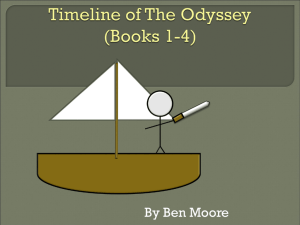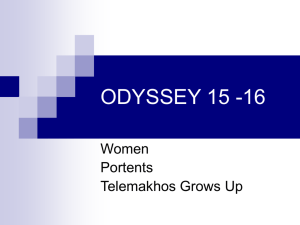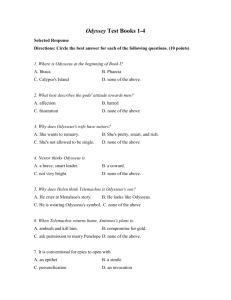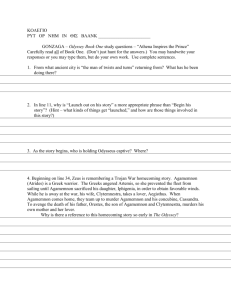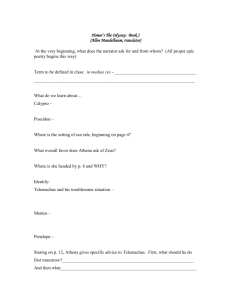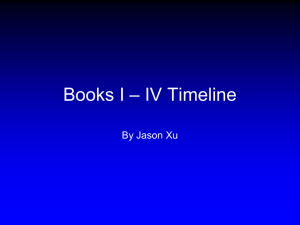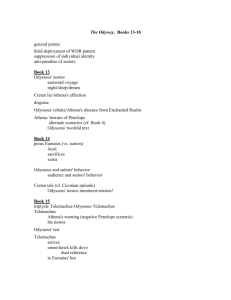English I Name: The Odyssey I. Read the first four pages (lines 1
advertisement
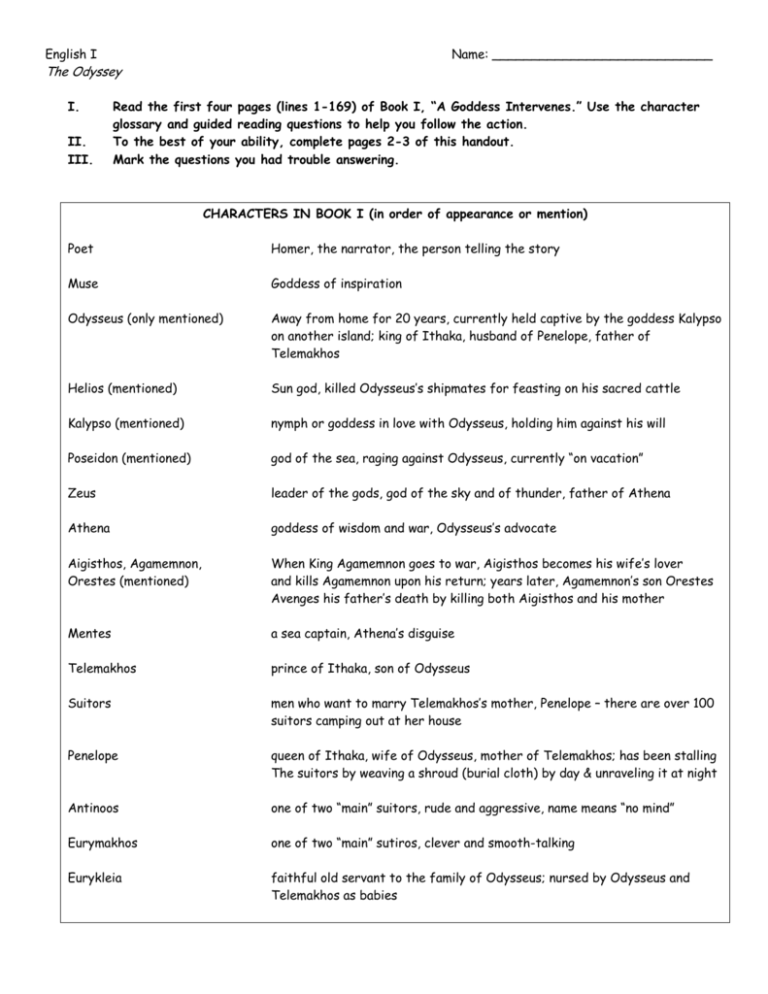
English I Name: ____________________________ The Odyssey I. II. III. Read the first four pages (lines 1-169) of Book I, “A Goddess Intervenes.” Use the character glossary and guided reading questions to help you follow the action. To the best of your ability, complete pages 2-3 of this handout. Mark the questions you had trouble answering. CHARACTERS IN BOOK I (in order of appearance or mention) Poet Homer, the narrator, the person telling the story Muse Goddess of inspiration Odysseus (only mentioned) Away from home for 20 years, currently held captive by the goddess Kalypso on another island; king of Ithaka, husband of Penelope, father of Telemakhos Helios (mentioned) Sun god, killed Odysseus’s shipmates for feasting on his sacred cattle Kalypso (mentioned) nymph or goddess in love with Odysseus, holding him against his will Poseidon (mentioned) god of the sea, raging against Odysseus, currently “on vacation” Zeus leader of the gods, god of the sky and of thunder, father of Athena Athena goddess of wisdom and war, Odysseus’s advocate Aigisthos, Agamemnon, Orestes (mentioned) When King Agamemnon goes to war, Aigisthos becomes his wife’s lover and kills Agamemnon upon his return; years later, Agamemnon’s son Orestes Avenges his father’s death by killing both Aigisthos and his mother Mentes a sea captain, Athena’s disguise Telemakhos prince of Ithaka, son of Odysseus Suitors men who want to marry Telemakhos’s mother, Penelope – there are over 100 suitors camping out at her house Penelope queen of Ithaka, wife of Odysseus, mother of Telemakhos; has been stalling The suitors by weaving a shroud (burial cloth) by day & unraveling it at night Antinoos one of two “main” suitors, rude and aggressive, name means “no mind” Eurymakhos one of two “main” sutiros, clever and smooth-talking Eurykleia faithful old servant to the family of Odysseus; nursed by Odysseus and Telemakhos as babies Find and copy the lines Line Bullet notes, 1-2 key phrases that answer the questions. #s Lines 1-41 – invocation to the Muse, introduction to the story, which begins in medias res How does the poet invoke the Muse (ask her for help)? 1 Muse “possesses” him so that he can sing the poem “Sing in me, Muse, and through me tell the story” Where is Odysseus first mentioned (not necessarily by name)? What has happened to O’s shipmates? At what point in O’s adventures does the narrative begin? Which god hates Odysseus? Lines 42-128 – conversation between Zeus and Athena on Mount Olympos Where are the other gods when the narrative begins? What is Zeus “meditating on” (reflecting on)? What concerns Athena? What epithet (descriptive word or phrase) is associated with Athena? What epithet is associated with Zeus? What is Hermes going to do? Lines 129-149 – Athena sees the suitors and Telemakhos. Where does Athena go? (Be specific.) How does Athena disguise herself? What does she see the suitors doing? What evidence do we have that the suitors are disrespectful guests? In what line is Telemakhos introduced? How is Telemakhos described? Lines 150-367 – conversation between Athena (in disguise) and Telemakhos – line numbers now provided How does Telemakhos react when he sees a stranger in the house? Comments so far: 150-168 How does Telemakhos describe what has been going on in Ithaka? What do you think Telemakhos means when he says, “Who has known his own engendering?” What does Athena tell Telemakhos to do? (There is more than one instruction.) 195-207, 276-298 260 318-344 Lines 368-500 – Athena leaves and Telemakhos begins to take action. How does Telemakhos know that his departing guest is one of the gods? Find a phrase that shows how Telemakhos has changed. 368-374 When is Penelope introduced, and how is she described? Why does she ask the minstrel to stop singing about the Homecoming of the Akhaians (Greeks)? 375-395 What does Telemakhos tell the suitors to do? How do they respond? Do you think they will do what he asks? 414-477 Write a transformation thesis about the change in Telemakhos in this chapter. Thinking about how structure supports theme: Why does Homer begin his epic here? ______________________________________________________________________________________ Literary terms – examples of these appear in this chapter as well as elsewhere in the story. Briefly define below. Epic Epic hero Invocation of the Muse In medias res Epithet
